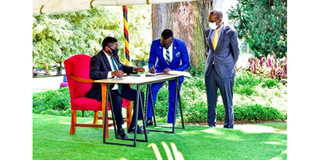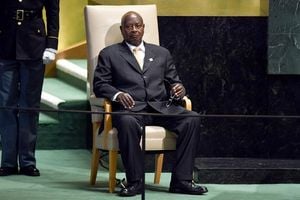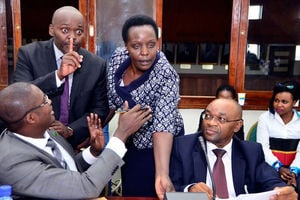
Justice minister Norbert Mao seems to be torn into two. Whereas he is aware that the idea of having Parliament elect a president is quite unpopular at this point in time, he is all too aware that it is one of the policy positions of his Democratic Party.
On September 23, a day before Justice and Constitutional Affairs minister Nobert Mao was scheduled to present the Constitutional Amendments Bill 2024 before Parliament, the political Opposition and sections of the civil society ripped the minister apart, accusing him of “betrayal”.
The belief at the time was that the Constitutional Amendment Bill 2024 sought to have Article 103 (1) of the Constitution either scrapped or amended.
Article 103(1) provides that, “The election of the President shall be by universal adult suffrage through a secret ballot.”
Mr Joseph Kabuleta, the president of the National Economic Empowerment Dialogue (NEED), suggested that the Bill was skewed towards continually taking power away from the people even when Article 1 of the Constitution says that power belongs to the people.
“I want to make this clear that they are not suggesting what they call a parliamentary system which applies in so many countries, but they are pushing something totally different. What they are saying is Parliament [should] actually elect the President,” Mr Kabuleta said.
Come September 24, a draft of the constitutional amendment Bill was presented before Parliament. To everyone’s dismay, there was nothing in it that suggested that there had been plans to vest the power of electing a President in Parliament.
The Bill instead sought to merge the Equal Opportunities Commission (EOC) with the Uganda Human Rights Commission (UHRC); put in place policies and principles that would give effect to the rationalisation of government agencies and public expenditure (Rapex) and; empower Parliament to make laws for the reform of the laws of Uganda.
The alleged plan to take the power of determining the presidency away from the masses and place it in the hands of an electoral college is being associated with Mr Mao who is now being viewed as a tool that President Museveni is using to promote his rule.
Since early August 2022 when he took charge of the Justice and Constitutional Affairs docket, Mr Mao has been promising a review of the Constitution and establishment of a truth and reconciliation commission that should lead to a peaceful transfer of power.
Those promises are supposed to be informed by the provisions of the cooperation agreement that his faction of the Democratic Party (DP) entered into with Mr Museveni and the ruling National Resistance Movement (NRM).
“The minister of Justice and Constitutional Affairs will be the lead minister for coordinating the national dialogue and the whole of government response on constitutional reforms with the mandate to coordinate budget proposals in the justice law and order sector,” Section 10 of the agreement says.In line with that, he has been consistent in his promises of reform, which has in recent times set him on a collision course with members of both the Opposition and the government sides.
Mr Mathis Mpuuga, the former Leader of the Opposition in Parliament (LoP), who is also the Nyendo-Mukungwe MP, recently attacked Mr Mao, saying the minister’s promised reforms are hot air. Mr Hamson Obua, the Government Chief Whip, has not helped matters by claiming that he does not know of any reforms that the minister is working on.
Mr Mao has largely been silent in the face of the attacks and what is fast turning out to be a very unpopular plan to vest the powers of electing the president in the hands of an electoral college. Is that unpopular idea one of the reforms in the offing?
“I am the one who told the media that I instructed the Uganda Law Reform Commission to compile all the ideas and that (proposed scrapping or amendment of Article 103(1)) is one of the ideas, but now they think that those are Mao’s ideas,” Mr Mao told Monitor.
Why then is the idea being associated with him? Mr Mao thinks that it is politics.“It is a normal trick of politics to associate your opponent with bad ideas. Since that idea is quite unpopular, they associate it with me,” Mr Mao says.
Mr Mao, however, seems to be torn into two. Whereas he is aware that the idea of having Parliament elect a president is quite unpopular at this point in time, he is all too aware that it is one of the policy positions of his Democratic Party (DP).
“What Ugandans forget is that this has been DP’s policy position for ages. And they forget that even in South Africa the president is elected from parliament. Even in Germany, a chancellor is elected in parliament,” he says.
How will he proceed? That we wait to see.
It should, however, be noted that calls for the amendment of the Constitution to place the powers of determining a president in the hands of an electoral college are not new. It was first brought up in January 2022 by a group referring to itself as “Transformer Cadres’ Association of Uganda”.
Led by Mr Felix Adupa Ongwech, who was beaten to the Kioga County seat by Mr Moses Okot, of the Forum for Democratic Change (FDC), the group called for the power to elect the President to be placed in the hands of Members of Parliament (MPs) and councillors at LC5 level.
“We have a proposal to amend electoral laws through a national referendum and other legislation to pave way for a hybrid parliamentary system, where the head of government, who also doubles as the head of state, is elected by Parliament and local government councils. Parliament may form a third of the voting constituency, while local government councillors form two-thirds of the voting constituency,” Mr Ongwech told the media during a press conference held at Kati Kati Restaurant in Kampala.
Back then, the Transformer Cadres’ Association Uganda proposal sparked off serious debate, but central to the debate was the objectivity of mostly people who had suffered defeat in the 2021 parliamentary elections.
Sections of the public believed that they were using the proposal to project themselves as highly committed cadres, whose loyalty merited rewards in the form of jobs or even money.
Mr Ongwech, however, always insisted that they were objective and had the right to contribute to good governance.
“We are stakeholders with a stake in the country. The Constitution allows us to have views and present them for consideration… It is not only for our benefit but also for many other Ugandans out there. There are many other patriotic Ugandans with the capability of leading this country but have been locked out. This system will ensure the best person leads us,” he argued.
Mr Ogwench’s group’s idea lost traction after Mr Thomas Tayebwa, who was then Government’s Chief Whip, made it known that Mr Museveni was opposed to the proposed amendment and did not want anything to do with it.
“Recently, the President explicitly came up to say that he does not support that idea because it lowers the legitimacy of whoever will have been elected to be President,” Mr Tayebwa said at the time.
The proposal has, however, suddenly returned to the discussion table and in a seemingly much more energised manner than before. The question now, is who is fuelling it?
Prof Paul Wangoola, a former member of the National Consultative Council, which served as Uganda’s Parliament under presidents Yusuf Lule and Godfrey Binaisa, believes that it is being fuelled by those who are likely to benefit from it. That in this case means Mr Museveni, or those who think they will benefit from his continued stay in power.
Whereas it is not for sure that Mr Museveni will be a candidate in the 2026 elections, there are all indicators that the man who recently celebrated his 80th birthday, will be the candidate of the ruling NRM. Organs of the party have already endorsed him as its candidate.
Mr Wangoola, however, believes that hitting a gruelling campaign trail may exact a heavy price on an Octogenarian.
“Campaigning countrywide is dicey. It has uncertainties. You stretch your energies and resources and if it is about rigging, it takes too much effort to rig around the country,” he argues.
He adds that a proposed amendment of Article 103(1) would also benefit the NRM as a party.
“Since the NRM is synonymous with the State, it is everywhere. It can, therefore, field a candidate in every constituency and do not forget that these are constituencies that they have carved out based on their needs and plans at a time when the Opposition cannot access or field candidates in every constituency,” Prof Wangoola argues.

President Museveni
Another school of thought argues that such an amendment would also suit a preferred successor if Mr Museveni opts to step down. It is believed that even if such a successor is not deemed to be as politically suave or as charismatic as Mr Museveni himself, it would be easy for him to get elected by Parliament.Mr Mao, however, seemed inclined to believe that Mr Museveni was not interested in having Article 103(1) amended.
“Incidentally, the President is not in favour of it because it lowers the legitimacy of whoever will have been elected to be President,” Mr Mao said.
Mr Museveni has, however, never drawn a line under the debate, which has perhaps kept the debate on the matter alive.
We have all heard the saying, “If it walks like a duck, talks like a duck, it probably is a duck”. So Ugandans should perhaps not forget that the proposed amendment is panning out in much the same way as the beginnings of previous amendments have panned out.
Mr Museveni has in the past chosen to either act ambiguous or disinterested in the goings on during debates that have raged prior to previous constitutional amendments. It would always be much later that he would come out in the open to show that he had always been supportive of certain positions.
After he was declared winner of the 1996 presidential elections, Mr Museveni declared before the press in Kampala that he would not be seeking another term in office, but ran for office in 2001 saying it would be his last second and last term in line with the two-term limits provided for under the Constitution.
Mr Museveni was for most of the time between 2001 and early 2003 quiet amid the cacophony that preceded the scrapping in 2005 of the term limits.
During a retreat at the National Leadership Institute (NALI) Kyankwanzi in March or April 2003, several NRM leaders, including Eriya Kategaya, Bidandi Ssali, Miria Matembe and Sarah Kyingi, opposed plans to scrap term limits on grounds that it would be a contravention of the constitutional order and rights that the NRM/A had fought for.
In what turned out to be the biggest manifestation of his interest in having the Constitution amended, Mr Museveni told off Mr Bidandi Ssali during a May 2003 meeting of the Movement Parliamentary Caucus.
Bidandi had dared ask why he was working to renege on an earlier promise to quit in 2006.“Who are you? You are just a mere spoke in the wheel! You can go,” Mr Museveni said.
Mr Bidandi Ssali, Eriya Kategaya, Miria Matembe and Sarah Kyingi were fired from Cabinet on May 28, 2005.In August 2016, Mr Museveni advised during an interview with NTV’s Patrick Kamara against maintenance in office of leaders aged 75 and above saying those who “want very active leaders” should be going for “the ones below 75 years of age”.
“Are you saying you wouldn’t go beyond 75 years yourself, sir?” Mr Kamara asked.
“Not at all. Certainly not,” he responded with finality.On December 20, 2017, Parliament voted to amend Article 102 (b) of the Constitution to remove both the lower and upper age limits of 35 and 75 years, which paved the way for him to continue contesting.
He later hailed those MPs who voted in favour of scrapping the age limit as “the new NRM historicals.” This too, could pan out the same way.








